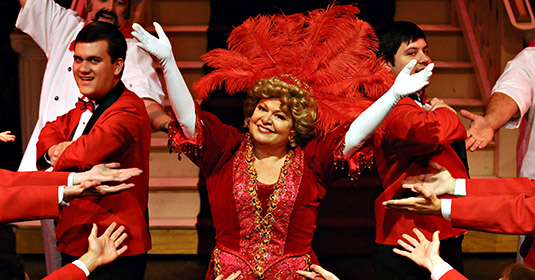Struthers to Perform in “Hello, Dolly!” in Abilene
By Sidney Schuhmann Levesque
 Sally Struthers is a two-time Emmy Award winning actress who earned fame playing Gloria Stivic on the hit 1970s sitcom “All in the Family.” Now she’s gaining rave reviews for playing the title role in “Hello, Dolly!” and touring the country in the Broadway musical production, which will be at the Abilene Civic Center at 7:30 p.m. Thursday, April 3 for one night only. The romantic comedy musical tells the story of Dolly Levi, a strong-willed matchmaker who travels to Yonkers, New York, to find a match for a grumpy “half-a-millionaire.” The show includes the popular songs “Put on Your Sunday Clothes,” “It Only Takes A Moment” and the show-stopping “Before the Parade Passes By.”
Sally Struthers is a two-time Emmy Award winning actress who earned fame playing Gloria Stivic on the hit 1970s sitcom “All in the Family.” Now she’s gaining rave reviews for playing the title role in “Hello, Dolly!” and touring the country in the Broadway musical production, which will be at the Abilene Civic Center at 7:30 p.m. Thursday, April 3 for one night only. The romantic comedy musical tells the story of Dolly Levi, a strong-willed matchmaker who travels to Yonkers, New York, to find a match for a grumpy “half-a-millionaire.” The show includes the popular songs “Put on Your Sunday Clothes,” “It Only Takes A Moment” and the show-stopping “Before the Parade Passes By.”
Q. This is your sixth time to play Dolly Levi. What keeps drawing you back to this role?
A. The offer of a job. … The first time someone calls and says, “I want you to play Dolly.” I ask, “How big of a part is that?” … After that it was just people calling up saying, “We’ve heard you’ve done Dolly before.” I’m one of those lucky people who don’t have to audition for parts. I get calls saying will you play this or that, and then it’s a matter of trying to fit them all in.
Q. This is 50th anniversary of “Hello, Dolly!” Why does the show remain so popular?
A. Every once in a while a play or a musical will be birthed and it will be perfect. It will have wonderful dialogue and an interesting plot when you don’t even have the music. So the music is a bonus to it. That’s what you’ve got here. Because Thornton Wilder wrote the play, “The Matchmaker.” And it was a popular play in its day. It’s still done in certain places. Then someone very bright said let’s turn this into a musical, and maybe the brightest of all was asking Jerry Herman to write the music and lyrics.
Q. You have a busy national tour. Is this your first time to Abilene, Texas?
A. I believe so, but you know, my memory is bad, and the thing about being on tour is your brain turns to mush. Honestly, you don’t know what day it is, and once you get to the next city, you don’t remember where you were before. Right now I’m in Little Rock, Ark., but I’m hard pressed to say where I was yesterday. I think it was Indiana. … I’ve been on enough tours that when I walk into a theatre and some of the crew says, “Welcome back, Sally!” that’s when I know I’ve been there before.
(The Abilene stop) will be our last week of doing the show. I’m ready to go home, but the cast and crew will be sad we won’t be spending 24 hours a day with each other anymore.
Q. You’ve said theater isn’t for sissies. How does it compare to your TV and movie roles?
A. You can be saved when you do a television show or a movie. … You can say, “Oops, let’s start over.” You can do seven takes before one is a print. You can be constantly saved as an actor. The editor can pick the finest moments and make you look more brilliant than you may be. When you walk out on stage, no one is going to yell, “Cut!” … You have to keep going. I liken it to a trapeze artist without a net. It’s probably the most difficult of the arts for the performer in that you aren’t going to stop when you start. … You have to find a way out of an awkward moment if you forget a line. .. You have to repeat it night after night, show after show and hopefully make it look like you’ve never said these lines before. In my humble opinion, that would make stage acting the most difficult, arduous and scary of all of the forms of performing.
Q. What is your dream role or project?
A. My dream project – and I don’t know what the role would be – would be to have a television series again. I’ve had five or six already. I’ve just been sublimely fortunate. But to have a television series again that would run for quite a while where I could get to do the comedy I love best, which is physical comedy like Melissa McCarthy does, that’s the kind of comedy I like to do. I’ve always been likened to Lucile Ball. I would love for a series where I could do all that physical comedy and be surrounded by wonderful actors with longevity.
On the road, I yearn to be back home and asleep in my own bed and see my daughter and dog. If I had a TV series in Los Angeles, I could be home every weekend and doing a job I love. I just would like to be back home and doing my own series. Your family and friends become so much as you get older. … I’ll be 67 this year, and I only have one older relative left. I’m now at the point friends are starting to pass away as well. You want to be home to spend precious time with them. That’s the interesting part of being a traveling salesman or actress – you are away from the people you love. You are plying your trade and loving your audiences and seeing America, but you are homesick.
Q. Who would you want to play you in a biopic?
A. It would depend on what section of my life they’re playing. … Reese Witherspoon when I was younger, and for the 50s and 60s and if I live long enough to my 70s it would be … I’m not sure. Who is like me? Funny is important to me. I want my tombstone to say, “Here lies a clown.” If they made it my lifetime, I would play me being older.
Q. When fans approach you, what question are you most often asked and what is your answer?
A. If they ask a question they are usually approaching you with trepidation, and they are not sure it’s me, and they ask, “Are you Sally?” More than questions, people make comments, and the comments are HI-larious, and you cannot believe the things that come out of people’s mouths. Their brains get a little scrambled when they meet someone famous, and I hear things like, “Oh my goodness, I never realized you are so short!” (She’s 5-foot-1.) I get the well-meaning, but sounds condescending, older people who say to me, “Oh hello, dear, it’s so nice to see you. We miss you on TV. Have you retired?” I say, “Actually, I never stopped working. I do regional theater, tours, television. I’ve been on ‘Gilmore Girls’ for seven seasons.” … They always say, “Well, we don’t watch much television.” And I want to say, “Well, if you don’t watch much TV, why are you assuming I’ve retired?” People are funny! Then there’s people who make demands. They’ll say, “We used to love it when you cried on ‘All in the Family.’ Will you cry for us?”
Q. When did you know you wanted to be a performer?
A. I don’t know if it was something conscious I knew or if it was something I unconsciously did. I lost my mom 17 and a half years ago and if she were alive, this is what she would say if you asked her that question – and my mom was extremely bright and profusely well-read, but she spoke incorrectly to make a point – when people would say, “How did you know Sally was going to be a performer?” She would say, “Sally was born with funny.”
From the time I was 2, I was entertaining the family and neighbors up and down the street. My entire wish every living moment was to make people happy. By the time I was in high school, I thought I would be a doctor like my dad. When I had a mental breakdown thinking about working on a cadaver for a year, my mom said, “Why don’t you go to a performing arts school?” I attended the Pasadena Playhouse College of Performing Arts. It was a three-year school. At the end of my second year, the Internal Revenue Service padlocked it shut, and I didn’t get to graduate.
Q. You have been a spokesperson for charities that help impoverished children around the world. What motivated you to get involved?
A. Growing up in my family motived me. I had a very altruistic family. My father was a physician who died penniless. He didn’t care about charging people money; he just wanted people to be well. My mother taught my sister and me to share what we had. My mother had us share our peaches from the backyard with all our neighbors. My grandmother sent money to the church every month to help a little girl in Korea. That’s what everyone in my family did. We helped people. When we got too big for our clothes, we sent them to people down the block who had a little girl.
When I was on “All in the Family” making more money than I did working a whole month as a receptionist, I found an ad and sponsored a little girl in the Philippines, and I did that a few months happily and quietly. And then the organization wrote to me and said, “Do you want to do something more than sponsor a child? Do you want to help us?” I flew back to the headquarters and went through it with a white glove to make sure they were on the up and up, and they were, so I said, “What do you want me to do?”
I wound up traveling and speaking for two different organizations for 35 years. I only stopped when I got sick. I realized I was in jeopardy. I got hepatitis in one of the Third World countries. Coming from a person who was taught to give and share, that was hard. In death, you can share your organs. Before you die, you can give blood transfusions, and I cannot do any of those things now. That makes me so sad.

























Leave a Reply